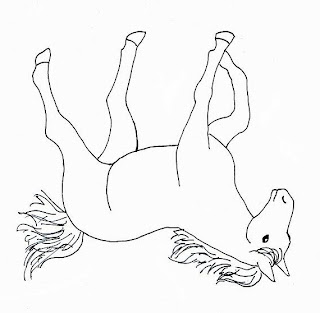 For example, when you look at a picture of a horse the regular way, your mind invariably takes over as you are drawing and you tend to draw what you remember how a horse looks, and not focus on the details in the picture in front of you. The image of the horse in your mind probably has an four thin legs as all horses do. But are you really seeing those legs as they appear in the picture, with all the angles and the lines?
For example, when you look at a picture of a horse the regular way, your mind invariably takes over as you are drawing and you tend to draw what you remember how a horse looks, and not focus on the details in the picture in front of you. The image of the horse in your mind probably has an four thin legs as all horses do. But are you really seeing those legs as they appear in the picture, with all the angles and the lines?Now look at this upside down picture of a horse. By turning the image around, we do not automatically see a horse, but a random design of angles and curved lines. It is much easier to notice how to draw the legs this way. Even the negative space in between the legs is easier to see and that can help us identify the shape of each leg.
Our drawings in class were created by looking at upside down photographs of wild animals in their natural habitat. This was a hard project for all of us but I am very proud of how accurate they turned out. Even the design in the colorful feathers and fur was a challenge to observe! Once we completed our drawings with pencil, we used blends of colored pencils to complete the scenes. To see all of our wildlife studies, click on this link to the Ranney home page on Artsonia. http://www.artsonia.com/schools/school.asp?id=114839
 |
| Artwork by Lily |
 |
| Artwork by Cristian |
 |
| Artwork by Devin |
 |
| Artwork by Zachary |
Note to families...
This art blog will be updated regularly with new posts sharing our daily activities in the art room and news about upcoming art exhibits. To respect the privacy of our students, names will always be limited to first name only and identifiable photos will never be accompanied with a name. If you have any questions or comments, please feel free to write in the comment box below or send me an email at blevine@ranneyschool.org. I would love to hear from you!
In my class, students are given the chance to explore different materials and fun new techniques as they develop their signature style. Some young artists love to draw with a pencil, some like to paint on canvas or create images in a digital format, while others prefer working with clay and molding three-dimensional forms. In my classroom, we use a variety of materials allowing all artists to experiment and figure out which type of art they like the best. At Ranney School, we place a strong emphasis on originality and celebrate artistic differences, always nurturing and encouraging the imagination of every student.
Remember to check out our display of finished artwork and student portfolios in the Ranney home page of Artsonia.com. http://www.artsonia.com/schools/school.asp?id=114839
No comments:
Post a Comment
Thank you for your thoughts!
Barbara Levine
Ranney Lower School Art